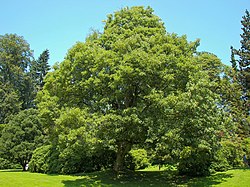ꙗворъ
Hello, you have come here looking for the meaning of the word ꙗворъ. In DICTIOUS you will not only get to know all the dictionary meanings for the word ꙗворъ, but we will also tell you about its etymology, its characteristics and you will know how to say ꙗворъ in singular and plural. Everything you need to know about the word ꙗворъ you have here. The definition of the word ꙗворъ will help you to be more precise and correct when speaking or writing your texts. Knowing the definition ofꙗворъ, as well as those of other words, enriches your vocabulary and provides you with more and better linguistic resources.
Old Ruthenian
ꙗ́воръ
Etymology
Inherited from Old East Slavic, from Proto-Slavic *àvorъ, borrowed from Old High German ahorn, from Proto-West Germanic *ahurn. Cognate with Russian я́вор (jávor).
Noun
ꙗворъ • (javor) m inan (related adjective ꙗворо́вый)
- sycamore maple (Acer pseudoplatanus)
- Synonym: кленъ (klen)
Descendants
- Belarusian: я́вар (jávar)
- Carpathian Rusyn: я́вур (jávur)
- Ukrainian: я́вір (jávir); явор (javor) (dialectal)
References
- ^ Trubachyov, Oleg, editor (1974), “*avorъ I”, in Этимологический словарь славянских языков (in Russian), numbers 1 (*a – *besědьlivъ), Moscow: Nauka, page 96
- ^ Melnychuk, O. S., editor (2012), “явір”, in Етимологічний словник української мови (in Ukrainian), volume 6 (У – Я), Kyiv: Naukova Dumka, →ISBN, page 531
Further reading
- Hrynchyshyn, D. H., editor (1977), “*яворъ”, in Словник староукраїнської мови XIV–XV ст. (in Ukrainian), volume 1 (А – М), Kyiv: Naukova Dumka, page 578
- The template Template:R:zle-mbe:HSBM does not use the parameter(s):
url=yavor
Please see Module:checkparams for help with this warning.Bulyka, A. M., editor (2017), “яворъ”, in Гістарычны слоўнік беларускай мовы (in Belarusian), numbers 37 (чорное – ящыкъ), Minsk: Belaruskaia navuka, →ISBN, page 287

